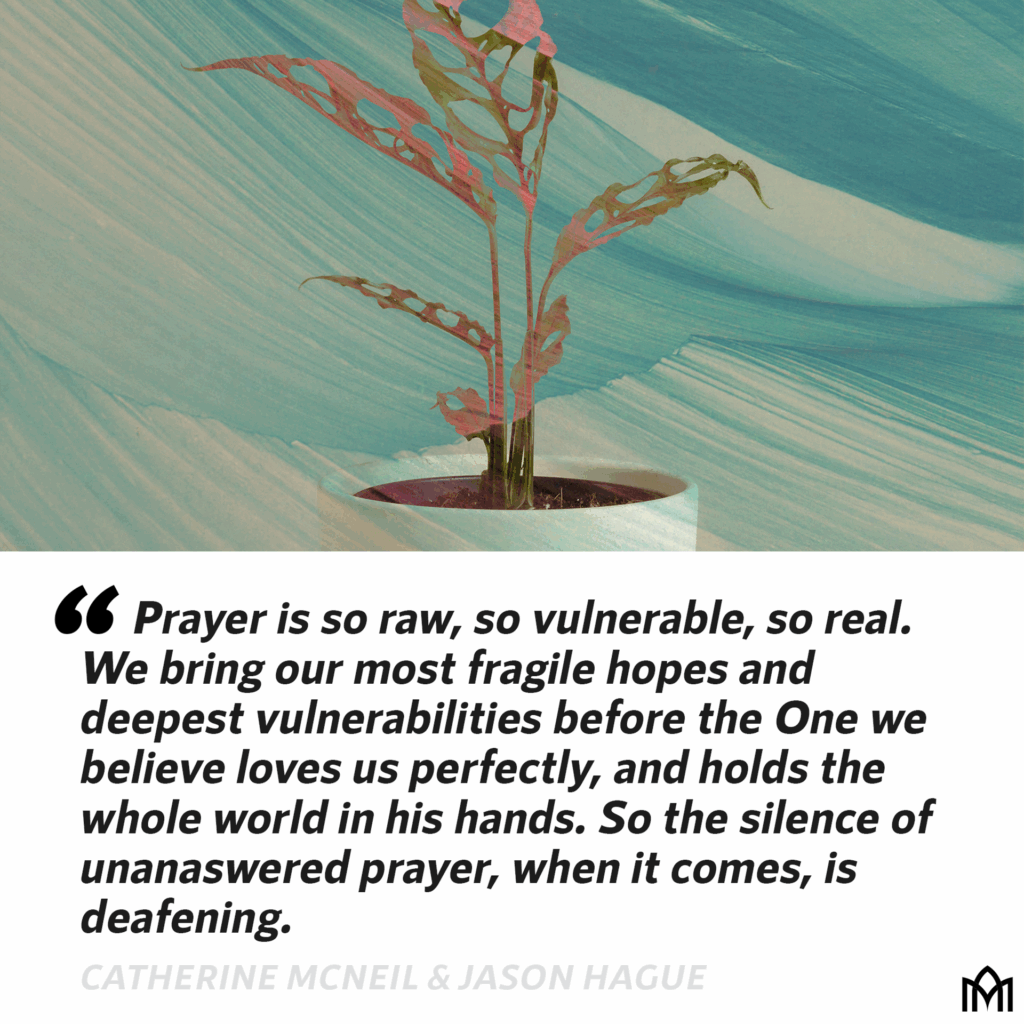Unanswered Prayer
Catalysts for Faith Crisis, Pt. 2
Six years ago, I (Catherine) suffered a traumatic brain injury. The doctors told me it would only take a few weeks to heal, but they were wrong. For months on end, I sat alone in a dark room, unable to read, look at screens, drive, or tolerate the hustle and bustle of having other people in the room (which meant no work, not church, no…anything).
I was devastated by my isolation. Unable to do anything for myself, I wished it were possible for a friend to cut a hole in the roof and lower me down to Jesus (See Mark 2). A few of them tried, eager to pray for me. I remember one prayer in particular, with hands laid on my head, voices crying out to God for my relief. I was thankful for their care, and eager for their prayers.
But afterwards, things would get awkward. Their spiritual care left me with the weight of burdens lifted, but the weight of expectation for healing added. Did their prayers do the trick? Was I healed? It’s interesting to see who stays close when problems linger on and on without the quick fix the doctor and the pray-ers expected.
No, I was not healed.
Mine is not a unique story. Many of us have spent years praying prayers that don’t seem to work. Our urgent, full-hearted prayers for healing, for safety, for restoration have gone unanswered. Sometimes we can shrug it off, reminding ourselves that the world is broken, and that God works in quiet, mysterious ways. We find a way to keep going.
But moving on isn’t easy, especially with the additional weight of haunting questions that years of unanswered prayer bring: Does God not hear me? Does God not care about me? Is God not good? Is God even real?
Recently, I was honored to sit at a table of women who had battled infertility for years. As they shared these most vulnerable of stories, their heartbreak and devastation were tangible. These women—and their families, friends, pastors, and church communities—had poured themselves out before God, begging for a child, for new life. Some were able to conceive, but many never did. One shared, through tears, of the long-hoped for child who died before his due date.
They had asked God for life, and all they received was death. They could no longer tolerate friends celebrating frivolous answers to prayer: a good parking spot, a favorite bracelet lost and then found. If God is to be credited for these things, what does that say about them and their value before the Almighty?
A theoretical discussion on unanswered prayer is one thing, but the trouble is, prayer is so raw, so vulnerable, so real. We bring our most fragile hopes and deepest vulnerabilities before the One we believe loves us perfectly, and holds the whole world in His hands. So the silence, when it comes, is deafening.
Many of us have spent years praying prayers that didn’t seem to work. Our urgent, full-hearted prayers for healing, for safety, for restoration have gone unanswered. Moving on isn’t easy. We wonder: Does God not care about me? Share on X
///
Have you ever prayed with a small child? There’s something deeply precious about little eyes scrunched up, little hands clenched together, head tilted towards the sky. It’s a posture of so much unvarnished trust and vulnerability—in the grown-ups who said “Let’s pray” and to the God they’re praying to. If a little child has been loved and cared for, even imperfectly, there’s an unselfconscious belief that someone’s got this. Little children pour out their hearts, stinging together updates about their snacks, their grandma’s health, a wish for a puppy, and their holiday plans.
I wonder if this is what Jesus meant when he said the only way for us adults to get to God was to become like little children (Matthew 18:3).
The trouble is, we’re not little children anymore.
In our new book, Mid-Faith Crisis, Catherine and I (Jason) discuss the reasons believers start to pull away from their faith. This issue is among the most common: our prayers turned out to be far less powerful than we expected. In fact, sometimes they seem downright worthless.
That’s a bitter pill for those of us who grew one of those children with scrunched up eyes. I was one of those kids back in the day. As I got older, I learned all about the God who hears our requests and answers every one. My teachers passed down their beliefs in an interactive and miracle-working Deity—one who invites us all to pray specific prayers, and to never give up. We were to be like the persistent widow, giving God no rest until He relents (Luke 18:1-8).
This approach is not all wrong. The New Testament welcomes petitionary prayers. Paul urges the church to “bring our requests to God” (Philippians 4:6). We are told to ask God for healing, for provision, for the gift of faith. We are even encouraged to believe that He will answer those requests.
So what happens to the full-hearted, earnest believers who lay their lives and hearts before God for years and never find relief from real suffering? They have tried the persistent widow formula, but the judge denied their request. What does that say about the judge…and about themselves?
I get it. In my own life, I have amassed a pretty impressive stack of unresolved pains. You probably have, too. As it turns out, suffering is quite common, and the longer we live, the more brokenness we encounter. We ask for God to fix our children, our bank accounts, our aging bodies, and the bombed out cities filling our timelines. Even if we receive breakthrough in one area, we soon find two urgent needs popping up to replace it until our confidence in God is overwhelmed by sheer numbers. Unless it’s us? Would God do what we ask if we did something differently, prayed louder and longer, somehow? Is our lack of relief a punishment?
Prayer is so raw, so vulnerable, so real. We bring our most fragile hopes and deepest vulnerabilities before the One we believe loves us perfectly, and holds the whole world in his hands. So the silence, when it comes, is deafening. Share on X
///
Those of us who were taught prayer as a way to convince God to do what we wanted may not realize how we’ve turned the focus on to ourselves and missed the bigger picture. Prayer can be so many things: telling God what we need is not the same as confession or thanksgiving, or simply sitting with Jesus on my porch swing.
Prayer is an awkwardly broad term defined by at least a dozen spiritual practices, each with its own rich history. Prayer could look like praise, thanksgiving, or intercession. It might take the form of a liturgy, a psalm, a chant, or even silence. We pray by standing or kneeling, closing our eyes or lighting a candle. We might pray the Prayer of Examen, the Jesus Prayer, the Lord’s Prayer, or countless more.
In hindsight, it feels unlikely that we could (or even should) convince God what to do, and I don’t even like the idea of an All-Powerful Being who makes decisions for our good only if enough people ask him, like a divine Doodle Poll.
But if we leave praying behind, we miss out on the vast array of ways to know God.
This past week, my (Catherine) brain trauma symptoms returned, suddenly. It’s been a painful and frightening regression, and I have no idea how long it will take me to go back to normal. More than six years into this journey of healing, I’m having to face the fact that this unexpected pop-up-shop of symptoms is my normal.
And yes, I am praying for relief. My family and friends are praying, too. But while I would shout for joy if God chose to heal me, that’s not the main lifting I’m hoping these prayers will do. Rather, I invite God’s presence to surround me. I thank God for the good work and good people who create the chaos my brain, eyes, and ears cannot tolerate this week. And while I sit silently in my dark bedroom, sometimes, sometimes a series of deep breath prayers reminds me that God sits with me even in this familiar darkness.
I very much want to tell God what he should do about this affliction. But if I’ve learned anything about prayer over the years it is this: I don’t get to tell God what to do.
So, in my distress, I ask God to take this cup from my hands. But before and after that, I say “Into your hands I release my spirit.”
///
*Editorial Note: The first piece in Catherine and Jason’s Catalysts for Faith Crisis series, entitled “Wolves in Shepherd’s Clothing,” can be read here.
It feels unlikely that we could (or even should) convince God what to do, and I don’t even like the idea of an All-Powerful Being who makes decisions for our good only if enough people ask him, like a divine Doodle Poll. Share on X




